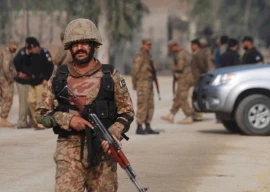
The debate on Wilson’s legacy here on campus got me thinking. As a Pakistani who grew up in the diaspora, thoroughly weaned on the private television channels that emerged post-1999 and General (retd) Musharraf’s takeover, I cannot recall a single April 4th when the story of Bhutto’s execution hasn’t been retold time and again by ‘eyewitnesses’ and close associates. Recycled stock footage galore of the former prime minister, and Benazir’s tearful recollection of her father’s last night at Central Jail Rawalpindi are ingrained in my mind as annual fixtures of April 4 ‘commemorative’ programming.
However, it isn’t just the media that is solely responsible for the constant glorification of the Bhuttos. As in the case of Wilson, there is no shortage of public spaces named after the former prime minister and his daughter. Although the trustee committee at Princeton has decided to be “honest and forthcoming about its history” and will recognise “Wilson’s failings and shortcomings” it will not rename the Woodrow Wilson School or the residential college on campus named after him. While their decision will continue to be debated, the baby step that the University has taken to acknowledge the darker part of Wilson’s legacy is a step in the right direction.
In Pakistan, on the other hand, it seems almost seditious to talk about ZAB or Benazir’s shortcomings. At a talk here on campus last semester, Mohammed Hanif told the audience that he would never write a satire about Benazir Bhutto like he wrote A Case of Exploding Mangoes. He said something along the lines of, “It’s too raw and painful,” referring to the former prime minister’s 2007 assassination. He is, instead, writing a libretto with composer Mohammed Fairouz, presumably an ode to the slain father-daughter duo.
The personality cult of ZAB and the deification of similar figures is an insult to the intelligence of Pakistanis in my generation, indoctrinated by the extremely subjective print journalism in the country, and infiltrated by the countless spaces named after Mr Bhutto and his daughter. While I am not proposing that SZABIST or the airport in Islamabad be renamed just yet, a commitment to being more transparent and objective about the controversial and damaging legacies of the figures that these spaces are named after is essential. Mindless veneration, or even vehement rejection for that matter, will not solve the problems that Pakistan faces as it struggles to craft a coherent historical narrative, so often rendered incoherent by the competing agendas of the military, and the aggressive PR campaigns mounted by dynastic heirs seeking votes for the next general election.
The fundamental lesson of the debate over Wilson’s legacy here at Princeton is that we can’t paint history, or historical figures, in monochrome colours; there is no black or white, good or evil. But, men like Woodrow Wilson and Zulfikar Ali Bhutto, surely, are a very dark shade of grey.
Published in The Express Tribune, April 14th, 2016.
Like Opinion & Editorial on Facebook, follow @ETOpEd on Twitter to receive all updates on all our daily pieces.
1732090022-0/Elmo-and-Amelia-(1)1732090022-0-405x300.webp)
1725523665-0/Minecraft-Movie-(1)1725523665-0-165x106.webp)

1732089759-0/BeFunky-collage-(75)1732089759-0-165x106.webp)

1732090878-3/Untitled-design-(22)1732090878-3-270x192.webp)

1724268870-0/Supreme-Court-of-Pakistan-(2)1724268870-0-270x192.webp)









COMMENTS (32)
Comments are moderated and generally will be posted if they are on-topic and not abusive.
For more information, please see our Comments FAQ